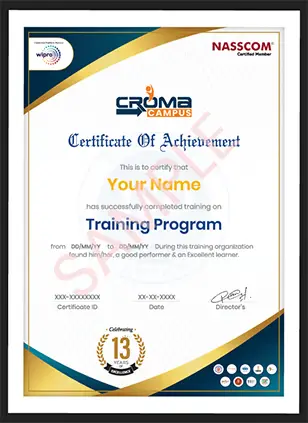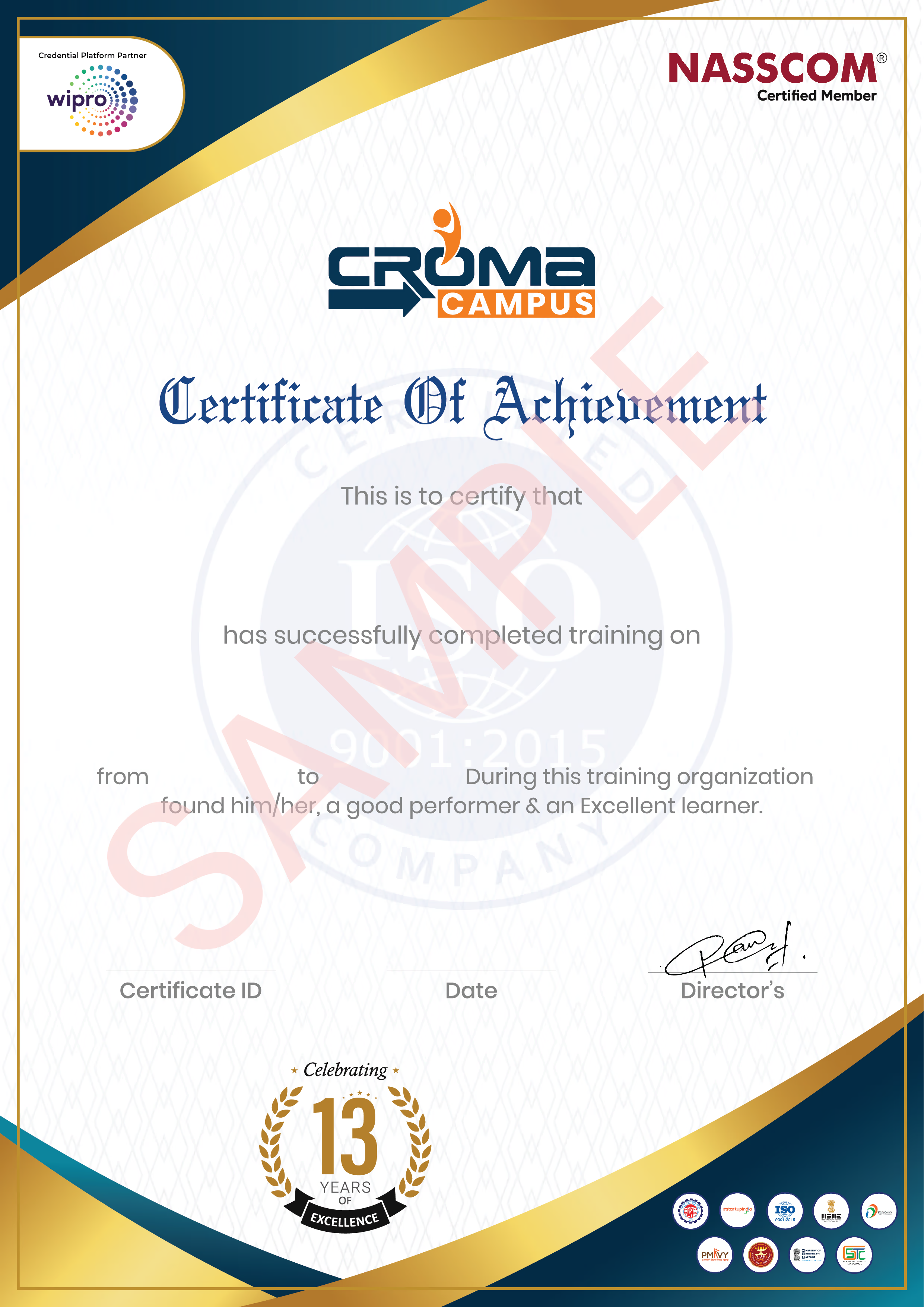- 2 Live Project
- Self-Paced/ Classroom
- Certification Pass Guaranteed
- The Python Course Training will make you an amazing Python programmer. You will learn how to improve the back-end code with front-end Python libraries in the Best Python Online Course with a Certificate. You will be able to learn real as well as hands-on proficiency tied with a good insight into the main Python language patterns, developmental procedures, and best practices.
- The Python Classes Online will teach you how to build, execute, and deploy Python web apps successfully as per the current industry standards. The Python Online Course with Certificate would be more theoretical at the initial as it is important for you to first understand the basics.
- You will get to learn the fundamental skills of Python and OOP concepts in the beginning. Towards the end of the Python Programming Course Online, you will start learning basic technical things of the Python programming language such as Python libraries, web app development with Python, containerizing web apps, and more.
- Once you are done with the basics, the next step is to move towards Python Programming Online Course and understand career opportunities and your role and responsibilities in the Python space.
- The exclusively customized Python Programming Course Online encourages you to pass the certifications and guarantees profound learning of different concepts related to Python programming such as installing Python package, Pandas, Scikit-Learn, SciPy, Matplotlib, NumPy, Lambda Function, Web scraping libraries, etc.
- Here are the main course objectives of Python Course Training you should know.
- With the best Python Language Online Course get advanced-level Python Course Training that can shape your career in a dynamic space of Python and set new heights for your career like never before.
The Major objective of the Python Online Training Course is to deliver the best understanding of core Python concepts and how this programming language can be used for real-world apps.
You will also gain relevant knowledge in designing or developing any application effectively.
The Python Classes Online are structured in such a way that you will get a depth understanding of the latest industry standards.
If you are a beginner and know nothing about Python, then you will be able to build and deploy your own Python app at the end of this Python Classes Online.
For intermediates and advanced workforce, the course is beneficial to improve their existing knowledge base and helps them become Python pros.
- The average salary of a Python Programmer at the entry-level is calculated at $74K per year. At the beginner level, he is responsible for basic things like designing testable code, reusable codes, or east scripts to execute simple tasks, etc. Anyone at the entry level with a degree in computer science or a similar discipline who has completed may quickly get into the Python domain.
- The average salary of a Python programmer at the experienced level is estimated at $160K per year. At the experienced or intermediate level, he is responsible for performing more tasks like deploying or executing a Python-based web app successfully, using Python libraries to improve the backend code and more. It may take years to reach that level but you should be skilled enough to handle all the responsibilities at the experienced level to grab that much salary package.
- The Python code is highly accessible and sustainable. Because of its extensive benefits, organizations are shifting to Python platforms rapidly. The wide adoption of the platform witnesses excellent future scope for learners and promises a plethora of job options too. So, take the Python online certification training today and fly higher with the right skills and knowledge base.
- Today, Python Certification Training is not enough but it is mandatory to prepare yourself as per the current industry standards to get hired quickly. At Croma Campus, concerning Python language Online Course we prepare for tough industry challenges that you may face at the workplace.
- Being the top provider of this Python Language Online Course, our Python course content is structured in such a way that you may clear your certification exam in the very first attempt only. At the same time, trainers are also remarkable and they are certified in the respective domain. We design our content after deep research as per the latest industry standards and the same is blended into an amazing Python curriculum.
As part of Python Online Classes we offer plenty of learning resources in terms of assignments, PPTs, MCQs, real-world projects, e-books, whitepapers, etc.
Upon the completion of the Python certification course, you will find yourself more eligible to apply for the global certification exam and gain credentials that are valid worldwide.
Make yourself industry-ready and work on multiple projects and assignments as part of the Python placement training. Our project-based learning helps you to grow in the Python space immensely.
- Python is a general-purpose programming language, based on OOPs concepts. It is suitable for handling data science work and it is used by data scientists daily to leverage the power of the Python programming language with routine business processes. The best part is that Python Certification Training can be learned by anyone and delivers high performance when compared to traditional programming languages.
- Python has plenty of features and benefits to consider. If we are discussing web development in Python, there are various control structures available that can be used for web development. In fact, the Python Course with Placement will help you know how to control the main structure and behaviour of the website.
- When you go through this in-demand course with Croma Campus, you can learn best practices and excellent ways to find robust web solutions needed by businesses to fathom. A Few Secrets about the Python Online Course with Certificate That Makes It a Smart Career Choice you should know:
- Now, you must be wondering why to considering enrolling in this course instead of classroom options. The biggest advantage of joining our Python Online Coaching is that there is no need to say bye to your current schedule. All you have to do is spare some extra time for sessions and you are done. You dont have to travel to someplace physically. You just have to participate in your comfort zone.
- A comprehensive Python Online Coaching will help you to learn the Python fundamental skills, OOPs concepts, best practices for programming, python libraries to improve your coding skills, and more that will further help you to take your career ahead in the programming space.
Python is one of the top programming languages to learn today with amazing career opportunities and a sustainable future scope.
There is a 47% increase in demand for Python specialists
The average salary of a Python programmer at the entry-level is $74K per annum which is quite attractive when compared to other programming languages.
More than 43K Python jobs were posted last year in the USA alone.
- Let us first discuss what can be the education requirements to become a Python programmer and join Python Online Coaching. There is a need for a bachelors degree in computers or any other discipline. You should be familiar with basic computer skills, Python basics, or OOPS concepts. You must be creative to face tough business challenges. You need to give strong attention to details to support coding errors. You should have strong oral and communication skills. And Python Online Training Course in a huge way to know its minute functionalities quite better.
- Moving ahead, let us see some common job roles and responsibilities in Python you must obey on the completion of the Python Online Course.
- Being the eminent provider of Python Online Course in India, we help you manage all these roles and responsibilities with the utmost skills and confidence.
You must know how to use server-side logic.
You must know how to build software for asset management.
A hands-on knowledge of writing and implementing software solutions to integrate different systems.
You must know how to write testable and usable code that can be used again.
You must know how to support new projects and implement solutions for the same.
You should know about integrating data storage solutions.
Know how to implement data security and protection.
- Microsoft, Google, Oracle, Cloud Big Data Technology, American Express, Cisco systems, Bank of America, etc.
- Everyone including software engineers, data analysts, software developers, and data scientists may benefit from the Python certification course online. And this is the reason why plenty of institutes offer online python training these days. However, to increase your chances of getting hired you should join the best provider of Python.
- Croma Campus is the most considerable choice where the Python Online Training in India is designed in such a way that everyone can benefit from it at different levels like beginners, intermediates, advanced workforce, etc. Our enriched study materials help you in preparing for Python job interviews.
- Also, we will give you a set of top Python Course Online in India interview questions to evaluate your skills. Our live sessions help to improve your communication skills and you can clear your doubts quickly. It is all that is needed for Python job interviews and to get hired by the top industries listed above.
- This specific course gives you adequate learning to clear any accreditation exam effectively. Once your Practical Python Training is finished, you have to complete a project to get qualified for the certification.
- You need to finish the task effectively and it will be audited by our specialists later to entitle you as a Certified Developer, Administrator, or Solution Architect. At the end, you will be given a training certificate as a valid proof of your skills.
- To be a great programmer, this respective course can surely help you to gain the relevant skills and knowledge base. All you need is a graduation to be eligible for the Python training. A lot of people have already joined Croma Campus for the online Python program. And it is your turn now!
- Looking for Download Python latest version for Windows, Linux, macOS, Click Here
- You May Also Read:
Why should you learn Python Online Course?
By registering here, I agree to Croma Campus Terms & Conditions and Privacy Policy
 Course Duration
Course Duration
32 Hrs.Flexible Batches For You
19-Apr-2025*
- Weekend
- SAT - SUN
- Mor | Aft | Eve - Slot
21-Apr-2025*
- Weekday
- MON - FRI
- Mor | Aft | Eve - Slot
23-Apr-2025*
- Weekday
- MON - FRI
- Mor | Aft | Eve - Slot
19-Apr-2025*
- Weekend
- SAT - SUN
- Mor | Aft | Eve - Slot
21-Apr-2025*
- Weekday
- MON - FRI
- Mor | Aft | Eve - Slot
23-Apr-2025*
- Weekday
- MON - FRI
- Mor | Aft | Eve - Slot
Course Price :
11,0009,90010% OFF, Save 1100Program fees are indicative only* Know more
Timings Doesn't Suit You ?
We can set up a batch at your convenient time.
Program Core Credentials
Trainer Profiles
Industry Experts
Trained Students
10000+
Success Ratio
100%
Corporate Training
For India & Abroad
Job Assistance
100%
BATCH TIMING
As per your requirementFOR QUERIES, FEEDBACK OR ASSISTANCE
Contact Croma Campus Learner Support
Best of support with us
Python Certification Training Programs
Python Certification TrainingPrograms
- Python is a very powerful high-level, object-oriented programming language. Python is an interpreted language. Python interpreters are available for many operating systems, allowing Python code to run on a wide variety of systems.
- Python has been a favourite option for Data Scientists who use it for building and using Machine Learning Applications and other Scientific Computations.
- Python cuts development time in half with its simple to read syntax and easy compilation feature. Debugging programs is a breeze in Python with its built in debugger.
- In this program you will learn:
Python Training Curriculum
Data Analysis and Visualization using NumPy, Pandas, and MatPlotLib,Seaborn
- In this program you will learn:
- Installation and Working with Python
- Understanding Python variables
- Python basic Operators
- Understanding the Python blocks.
Introduction To Python
- In this program you will learn:
- Python Keyword and Identifiers
- Python Comments, Multiline Comments.
- Python Indentation
- Understating the concepts of Operators
- Arithmetic
- Relational
- Logical
- Assignment
- Membership
- Identity
Python Keyword and Identifiers
- In this program you will learn:
- Variables, expression condition and function
- Global and Local Variables in Python
- Packing and Unpacking Arguments
- Type Casting in Python
- Byte objects vs. string in Python
- Variable Scope
Introduction To Variables:
- In this program you will learn:
- Declaring and using Numeric data types
- Using string data type and string operations
- Understanding Non-numeric data types
- Understanding the concept of Casting and Boolean.
- Strings
- List
- Tuples
- Dictionary
- Sets
Python Data Type:
- In this program you will learn:
- Statements – if, else, elif
- How to use nested IF and Else in Python
- Loops
- Loops and Control Statements.
- Jumping Statements – Break, Continue, pass
- Looping techniques in Python
- How to use Range function in Loop
- Programs for printing Patterns in Python
- How to use if and else with Loop
- Use of Switch Function in Loop
- Elegant way of Python Iteration
- Generator in Python
- How to use nested Loop in Python
- Use If and Else in for and While Loop
- Examples of Looping with Break and Continue Statement
- How to use IN or NOT IN keyword in Python Loop.
Control Structure & Flow
- In this program you will learn:
- Python Syntax
- Function Call
- Return Statement
- Arguments in a function – Required, Default, Positional, Variable-length
- Write an Empty Function in Python –pass statement.
- Lamda/ Anonymous Function
- *args and **kwargs
- Help function in Python
- Scope and Life Time of Variable in Python Function
- Nested Loop in Python Function
- Recursive Function and Its Advantage and Disadvantage
- Organizing python codes using functions
- Organizing python projects into modules
- Importing own module as well as external modules
- Understanding Packages
- Random functions in python
- Programming using functions, modules & external packages
- Map, Filter and Reduce function with Lambda Function
- More example of Python Function
Python Function, Modules and Packages
- In this program you will learn:
- Day, Month, Year, Today, Weekday
- IsoWeek day
- Date Time
- Time, Hour, Minute, Sec, Microsec
- Time Delta and UTC
- StrfTime, Now
- Time stamp and Date Format
- Month Calendar
- Itermonthdates
- Lots of Example on Python Calendar
- Lots of Example on Python Calendar
- Create 12-month Calendar
- Strftime
- Strptime
- Format Code list of Data, Time and Cal
- Locale’s appropriate date and time
Python Date Time and Calendar:
- In this program you will learn:
- What is List.
- List Creation
- List Length
- List Append
- List Insert
- List Remove
- List Append & Extend using “+” and Keyword
- List Delete
- List related Keyword in Python
- List Revers
- List Sorting
- List having Multiple Reference
- String Split to create a List
- List Indexing
- List Slicing
- List count and Looping
- List Comprehension and Nested Comprehension
List
- In this program you will learn:
- What is Tuple
- Tuple Creation
- Accessing Elements in Tuple
- Changing a Tuple
- Tuple Deletion
- Tuple Count
- Tuple Index
- Tuple Membership
- TupleBuilt in Function (Length, Sort)
Tuple
- In this program you will learn:
- Dict Creation
- Dict Access (Accessing Dict Values)
- Dict Get Method
- Dict Add or Modify Elements
- Dict Copy
- Dict From Keys.
- Dict Items
- Dict Keys (Updating, Removing and Iterating)
- Dict Values
- Dict Comprehension
- Default Dictionaries
- Ordered Dictionaries
- Looping Dictionaries
- Dict useful methods (Pop, Pop Item, Str , Update etc.)
Dictionary
- In this program you will learn:
- What is Set
- Set Creation
- Add element to a Set
- Remove elements from a Set
- PythonSet Operations
- Frozen Sets
Sets
- In this program you will learn:
- What is Set
- Set Creation
- Add element to a Set
- Remove elements from a Set
- PythonSet Operations
Strings
- In this program you will learn:
- Python Errors and Built-in-Exceptions
- Exception handing Try, Except and Finally
- Catching Exceptions in Python
- Catching Specific Exception in Python
- Raising Exception
- Try and Finally
Python Exception Handling
- In this program you will learn:
- Opening a File
- Python File Modes
- Closing File
- Writing to a File
- Reading from a File
- Renaming and Deleting Files in Python
- Python Directory and File Management
- List Directories and Files
- Making New Directory
- Changing Directory
Python File Handling
- In this program you will learn:
- SQL Database connection using
- Creating and searching tables
- Reading and Storing config information on database
- Programming using database connections
Python Database Interaction
- In this program you will learn:
- Installing SMTP Python Module
- Sending Email
- Reading from file and sending emails to all users
Contacting user Through Emails Using Python
- In this program you will learn:
- Working With Excel
- Reading an excel file using Python
- Writing to an excel sheet using Python
- Python| Reading an excel file
- Python | Writing an excel file
- Adjusting Rows and Column using Python
- ArithmeticOperation in Excel file.
- Play with Workbook, Sheets and Cells in Excel using Python
- Creating and Removing Sheets
- Formatting the Excel File Data
- More example of Python Function
Reading an excel
- In this program you will learn:
- Check Dirs. (exist or not)
- How to split path and extension
- How to get user profile detail
- Get the path of Desktop, Documents, Downloads etc.
- Handle the File System Organization using OS
- How to get any files and folder’s details using OS
Complete Understanding of OS Module of Python
- In this program you will learn:
- Introduction to NumPy: Numerical Python
- Importing NumPy and Its Properties
- NumPy Arrays
- Creating an Array from a CSV
- Operations an Array from aCSV
- Operations with NumPy Arrays
- Two-Dimensional Array
- Selecting Elements from 1-D Array
- Selecting Elements from 2-D Array
- Logical Operation with Array
NumPy
- In this program you will learn:
- Working With Excel using Pandas
- Reading an excel & CSV file using Pandas
- Writing to an excel sheet using Pandas
- Adjusting Rows and Column using Pandas
- Arithmetic Operation in Excel file using Pandas.
- Play with Workbook, Sheets and Cells in Excel using Pandas
- Creating and Removing Sheets using Pandas
- Formatting the Excel File Data using Pandas
Pandas
- In this program you will learn:
- Bar Chart using Python MatPlotLib
- Column Chart using Python MatPlotLib
- Pie Chart using Python MatPlotLib
- Area Chart using Python MatPlotLib
- Scatter Plot Chart using Python MatPlotLib
- Export the Chart as Image
- Create Charts as Image
- Other Useful Properties of Charts.
- Plotting Different Charts, Labels, and Labels Alignment etc.
MatPlotLib
- In this program you will learn:
- Introduction to Seaborn
- Making a scatter plot with lists
- Making a count plot with a list
- Using Pandas with seaborn
Introduction to Seaborn
- In this program you will learn:
- Concept of Class, Object and Instances
- Constructor, Class attributes and Destructors
- Real time use of class in live projects
- Inheritance, Overlapping and Overloading operators
- Adding and retrieving dynamic attributes of classes
- Programming using Oops support
Python Object Oriented Programming—Oops Concepts
- 2 Live Project
- Self-Paced/ Classroom
- Certification Pass Guaranteed
- Python is a very powerful high-level, object-oriented programming language. Python is an interpreted language. Python interpreters are available for many operating systems, allowing Python code to run on a wide variety of systems.
- Using third-party tools, such as Py2exe or Pyinstaller Python code can be packaged into stand-alone executable programs. Django is an extremely widely used framework, and because it’s open source. Django is a web framework which written in python & follows the MVC architectural pattern.
- It is maintained by the Django software foundation, an independent organization. There are many other frameworks like Pyramid, web2py, Flask etc. which support developers in the design & maintenance of complex applications. Pyjamas & Iron Python can be used to develop the client-side of ajax-based applications.
- In this program you will learn:
HTML
HTML 5
CSS 2.0
CSS 3.0
JavaScript
JQuery
Bootstrap Framework Latest Version (HTML, CSS, and JS Library)
Web Hosting & SEO Basics
Python Training Curriculum
Data Analysis and Visualization using NumPy, Pandas, and MatPlotLib, Seaborn
Placement Guide
- HTML
What is HTML
What is a Web Browser
What are Versions of HTML
What can you Do with HTML
HTML Development Environments
Writing Code with a Text Editor
- Review of HTML Elements
Rules of Syntax
Making your Code Readable
Building a Document
Using Colors
Adding Color to your Page
Using Headings
Using Paragraphs
Aligning Block-Level Elements
- Inserting Spaces and Line Breaks
Displaying Preformatted Text
Formatting with Inline Elements
Controlling Fonts
Introducing List Elements
Creating Unordered Lists
Creating Ordered Lists
Nesting Lists
- What is an HTML Table
Building a Table
Cell Padding and Cell Spacing
Controlling Table and Cell Width
Aligning a Table on the Page
Aligning Tables and Text
Aligning Table Data
Spanning Columns and Rows
- Creating a Hyperlink
Understanding and Using URLs
Linking to a Web Document
Linking to a Local Document
Linking to Anchors
Opening a New Browser Window
- Image Formats
Inserting Inline Images
Aligning Images
Using Images to Anchor Links
Sizing Images
Using Transparent Images
Using GIF Animation
- Forms and Controls
Forms and Form Elements
Form Actions, Form Methods, Form Design
- Introduction
Laying out a page with HTML5
Page Structure
New HTML5 Strutural Tags
Page Simplification
- HTML 5 - How we got here
New Features of HTML5
The HTML5 Semantic Element
Current State of Browser Support
- SECTIONS AND ARTICLES
The section Tag
The article Tag
The header Tag
The Footer Tag
- HTML5 AUDIO AND VIDEO
Supported Media Types
The audio Element
The video Element
- HTML5 FORMS
New Input Types
- HTML5 NEW FORM ATTRIBUTES
autocomplete
novalidate
- HTML5 NEW FORM FIELD ATTRIBUTES
required
placeholder
autofocus
autocomplete
form
pattern
- Introduction of CSS
- CSS Syntax
- CSS Comments
- CSS Type
Inline
Internal
External
- CSS Selector
ID
Class
Attribute
Grouping
Universal
- CSS Color
RGB Value
Hex Value
Color Name
- Background
background-color
background-repeat
background-attachement
background position
background-size
background-image
- CSS Margin
Margin-top
Margin-bottom
Margin-left
Margin-Right
- CSS Padding
Padding -top
Padding -bottom
Padding -left
Padding –Right
- Outline
Outline-Style
Outline-color
Outline Width
Outline-Offset
Outline Shorthand Property
- CSS Height and Width
- CSS Display properties
- CSS Position Properties
- CSS Overflow
- CSS Float and Clear
- Pseudo Class and Element
- Introduction to CSS 3
Border
border-radius
- CSS Shadows
Text-shadow
Box-shadow
- Transitions
transition
transition - delay
transition - duration
transition - property
- 2D Transforms
transform
matrix ()
translate (x,y)
scale(x,y)
rotate(angle)
Skew (x - angle, y-angle)
- Animations
@keyframes
animation
animation-direction
animation-duration
animation-name
- Selectors
CSS combinations
Pseudo Elements
- Gradients
Linear Gradients
Radial Gradients
- User Interface
resize
box-sizing
outline-offset
- CSS Filters
Blur
Opacity
- Media Query
What is Responsive Web Design
Intro to the Viewport
The Viewport Tag
Media Queries
Tablet Styles
Mobile Styles
Making a Mobile Drop-down Menu
- Web Fonts
@font-face
font- family
src
font-stretch
font-Style
font-weight
- Flexbox
flex - grow
flex - shrink
flex - basis
flex
flex - wrap
flex - direction
flex - flow
justify - content
align-items
order
- 1 Live Project
- Self-Paced/ Classroom
- Certification Pass Guaranteed
- Croma Campus's Django course helps you gain expertise in Django REST framework, Django Models, Django AJAX, Django jQuery etc. You'll master Django web framework while working on real-time use cases and receive Django certification at the end of the course.
- In this program you will learn:
Django Web Framework
Getting Started with Django
Create an Application
Django - URL Mapping
Django Template Language (DTL)
Django – Models
Django – Sending E-mails
Django – Form Processing/le handling/cooking handling
Django Admin
Django API (Application Program Interface)
Static les
Placement Guide
- Django Web Framework
What is a Framework
Introduction to Django
Django – Design Philosophies
History of Django
Why Django and Features
Environment setup
Web Server
MVC Pattern
MVC Architecture vs MVT Architecture
Django MVC – MVT Pattern
- Getting Started with Django
Creating the rst Project
Integrating the Project to sublime text
The Project Structure
Running the server
Solving the issues and Migrations
Database Setup
Setting Up Your Project.
- Create an Application
What Django Follows
Structure of Django framework
Model Layer
What are models
Model elds
Query sets
Django – Admin Interface
Starting the Admin Interface
Migrations
Views Layer
Simple View
Basic view (displaying hello world)
Functional views, class based views
- Django - URL Mapping
Organizing Your URLs
Role of URLs in Django
Working URLs
Forms
Sending Parameters to Views
Templates layer
The Render Function
- 2 Live Project
- Self-Paced/ Classroom
- Certification Pass Guaranteed
- Python has been a favourite option for Data Scientists who use it for building and using Machine Learning Applications and other Scientific Computations. Python cuts development time in half with its simple to read syntax and easy compilation feature. Debugging programs is a breeze in Python with its built in debugger.
- In this program you will learn:
Python Training
Data Analysis and Visualization using Pandas.
Data Analysis and Visualization using NumPy and MatPlotLib
Introduction to Data Visualization with Seaborn
- Introduction To Python
Installation and Working with Python
Understanding Python variables
Python basic Operators
Understanding the Python blocks.
- Python Keyword and Identiers
- Arithmetic
- Relational
- Logical
- Assignment
- Membership
- Identity
Python Keyword and Identiers
Python Comments, Multiline Comments.
Python Indentation
Understating the concepts of Operators
- Introduction To Variables
Variables, expression condition and function
Global and Local Variables in Python
Packing and Unpacking Arguments
Type Casting in Python
Byte objects vs. string in Python
Variable Scope
- Python Data Type
Declaring and using Numeric data types
Using string data type and string operations
Understanding Non-numeric data types
Understanding the concept of Casting and Boolean.
Strings
List
Tuples
Dictionary
Sets
- Control Structure & Flow
Statements – if, else, elif
How to use nested IF and Else in Python
Loops
Loops and Control Statements.
Jumping Statements – Break, Continue, pass
Looping techniques in Python
How to use Range function in Loop
Programs for printing Patterns in Python
How to use if and else with Loop
Use of Switch Function in Loop
Elegant way of Python Iteration
Generator in Python
How to use nested Loop in Python
Use If and Else in for and While Loop
Examples of Looping with Break and Continue Statement
How to use IN or NOT IN keyword in Python Loop.
- Python Function, Modules and Packages
Python Syntax
Function Call
Return Statement
Arguments in a function – Required, Default, Positional, Variable-length
Write an Empty Function in Python –pass statement.
Lamda/ Anonymous Function
*args and **kwargs
Help function in Python
Scope and Life Time of Variable in Python Function
Nested Loop in Python Function
Recursive Function and Its Advantage and Disadvantage
Organizing python codes using functions
Organizing python projects into modules
Importing own module as well as external modules
Understanding Packages
Random functions in python
Programming using functions, modules & external packages
Map, Filter and Reduce function with Lambda Function
More example of Python Function
- Python Date Time and Calendar
Day, Month, Year, Today, Weekday
IsoWeek day
Date Time
Time, Hour, Minute, Sec, Microsec
Time Delta and UTC
StrfTime, Now
Time stamp and Date Format
Month Calendar
Itermonthdates
Lots of Example on Python Calendar
Create 12-month Calendar
Strftime
Strptime
Format Code list of Data, Time and Cal
Locale’s appropriate date and time
- List
What is List.
List Creation
List Length
List Append
List Insert
List Remove
List Append & Extend using “+” and Keyword
List Delete
List related Keyword in Python
List Revers
List Sorting
List having Multiple Reference
String Split to create a List
List Indexing
List Slicing
List count and Looping
List Comprehension and Nested Comprehension
- Tuple
What is Tuple
Tuple Creation
Accessing Elements in Tuple
Changing a Tuple
Tuple Deletion
Tuple Count
Tuple Index
Tuple Membership
TupleBuilt in Function (Length, Sort)
- Dictionary
Dict Creation
Dict Access (Accessing Dict Values)
Dict Get Method
Dict Add or Modify Elements
Dict Copy
Dict From Keys.
Dict Items
Dict Keys (Updating, Removing and Iterating)
Dict Values
Dict Comprehension
Default Dictionaries
Ordered Dictionaries
Looping Dictionaries
Dict useful methods (Pop, Pop Item, Str , Update etc.)
- Sets
What is Set
Set Creation
Add element to a Set
Remove elements from a Set
PythonSet Operations
Frozen Sets
- Strings
What is Set
Set Creation
Add element to a Set
Remove elements from a Set
PythonSet Operations
- Python Exception Handling
Python Errors and Built-in-Exceptions
Exception handing Try, Except and Finally
Catching Exceptions in Python
Catching Specic Exception in Python
Raising Exception
Try and Finally
- Python File Handling
Opening a File
Python File Modes
Closing File
Writing to a File
Reading from a File
Renaming and Deleting Files in Python
Python Directory and File Management
List Directories and Files
Making New Directory
Changing Directory
- Python Database Interaction
SQL Database connection using
Creating and searching tables
Reading and Storing cong information on database
Programming using database connections
- Contacting user Through Emails Using Python
Installing SMTP Python Module
Sending Email
Reading from le and sending emails to all users
- Reading an excel
Working With Excel
Reading an excel le using Python
Writing to an excel sheet using Python
Python| Reading an excel le
Python | Writing an excel le
Adjusting Rows and Column using Python
ArithmeticOperation in Excel le.
Play with Workbook, Sheets and Cells in Excel using Python
Creating and Removing Sheets
Formatting the Excel File Data
More example of Python Function
- Complete Understanding of OS Module of Python
Check Dirs. (exist or not)
How to split path and extension
How to get user prole detail
Get the path of Desktop, Documents, Downloads etc.
Handle the File System Organization using OS
How to get any les and folder’s details using OS
- Statistics
Categorical Data
Numerical Data
Mean
Median
Mode
Outliers
Range
Interquartile range
Correlation
Standard Deviation
Variance
Box plot
- Pandas
Read data from Excel File using Pandas More Plotting, Date Time Indexing and writing to les
How to get record specic records Using Pandas Adding & Resetting Columns, Mapping with function
Using the Excel File class to read multiple sheets More Mapping, Filling
Nonvalue’s
Exploring the Data Plotting, Correlations, and Histograms
Getting statistical information about the data Analysis Concepts, Handle the None Values
Reading les with no header and skipping records Cumulative Sums and Value Counts, Ranking etc
Reading a subset of columns Data Maintenance, Adding/Removing Cols and Rows
Applying formulas on the columns Basic Grouping, Concepts of Aggre
gate Function
Complete Understanding of Pivot Table Data Slicing using iLoc and Loc property (Setting Indices)
Under sting the Properties of Pivot Table in Pandas Advanced Reading
CSVs/HTML, Binning, Categorical Data
Exporting the results to Excel Joins:
Python | Pandas Data Frame Inner Join
Under sting the properties of Data Frame Left Join (Left Outer Join)
Indexing and Selecting Data with Pandas Right Join (Right Outer Join)
Pandas | Merging, Joining and Concatenating Full Join (Full Outer Join)
Pandas | Find Missing Data and Fill and Drop NA Appending DataFrame and Data
Pandas | How to Group Data How to apply Lambda / Function on Data
Frame
Other Very Useful concepts of Pandas in Python Data Time Property in Pandas (More and More)
- NumPy
Introduction to NumPy: Numerical Python
Importing NumPy and Its Properties
NumPy Arrays
Creating an Array from a CSV
Operations an Array from a CSV
Operations with NumPy Arrays
Two-Dimensional Array
Selecting Elements from 1-D Array
Selecting Elements from 2-D Array
Logical Operation with Arrays
Indexing NumPy elements using conditionals
NumPy’s Mean and Axis
NumPy’s Mode, Median and Sum Function
NumPy’s Sort Function and More
- MatPlotLib
Bar Chart using Python MatPlotLib
Column Chart using Python MatPlotLib
Pie Chart using Python MatPlotLib
Area Chart using Python MatPlotLib
Scatter Plot Chart using Python MatPlotLib
Play with Charts Properties Using MatPlotLib
Export the Chart as Image
Understanding plt. subplots () notation
Legend Alignment of Chart using MatPlotLib
Create Charts as Image
Other Useful Properties of Charts.
Complete Understanding of Histograms
Plotting Different Charts, Labels, and Labels Alignment etc.
- Introduction to Seaborn
Introduction to Seaborn
Making a scatter plot with lists
Making a count plot with a list
Using Pandas with seaborn
Tidy vs Untidy data
Making a count plot with a Dataframe
Adding a third variable with hue
Hue and scattera plots
Hue and count plots
- Visualizing Two Quantitative Variables
Introduction to relational plots and subplots
Creating subplots with col and row
Customizing scatters plots
Changing the size of scatter plot points
Changing the style of scatter plot points
Introduction to line plots
Interpreting line plots
Visualizing standard deviation with line plots
Plotting subgroups in line plots
- Visualizing a Categorical and a Quantitative Variable
Current plots and bar plots
Count plots
Bar plot with percentages
Customizing bar plots
Box plots
Create and interpret a box plot
Omitting outliers
Adjusting the whisk
Point plots
Customizing points plots
Point plot with subgroups
- Customizing Seaborn Plots
Changing plot style and colour
Changing style and palette
Changing the scale
Using a custom palette
Adding titles and labels: Part 1
Face Grids vs. Axes Subplots
Adding a title to a face Grid object
Adding title and labels: Part 2
Adding a title and axis labels
Rotating x-tics labels
Putting it all together
Box plot with subgroups
Bar plot with subgroups and subplots
Well done! What’s next
- 3 Live Project
- Self-Paced/ Classroom
- Certification Pass Guaranteed
- Machine learning is important because it gives enterprises a view of trends in ustomer behavior and business operational patterns, as well as supports the development of new products. Many of today's leading companies, such as Facebook, Google and Uber, make machine learning a central part of their operations
- In this program you will learn:
Python Training Curriculum
Data Analysis and Visualization using Pandas.
Data Analysis and Visualization using NumPy and MatPlotLib
Introduction to Data Visualization with Seaborn
Machine Learning
- Introduction To Python
Installation and Working with Python
Understanding Python variables
Python basic Operators
Understanding the Python blocks.
- Python Keyword and Identiers
- Arithmetic
- Relational
- Logical
- Assignment
- Membership
- Identity
Python Keyword and Identiers
Python Comments, Multiline Comments.
Python Indentation
Understating the concepts of Operators
- Introduction To Variables
Variables, expression condition and function
Global and Local Variables in Python
Packing and Unpacking Arguments
Type Casting in Python
Byte objects vs. string in Python
Variable Scope
- Python Data Type
- Strings
- List
- Tuples
- Dictionary
- Sets
Declaring and using Numeric data types
Using string data type and string operations
Understanding Non-numeric data types
Understanding the concept of Casting and Boolean.
- Control Structure & Flow
Statements – if, else, elif
How to use nested IF and Else in Python
Loops
Loops and Control Statements.
Jumping Statements – Break, Continue, pass
Looping techniques in Python
How to use Range function in Loop
Programs for printing Patterns in Python
How to use if and else with Loop
Use of Switch Function in Loop
Elegant way of Python Iteration
Generator in Python
How to use nested Loop in Python
Use If and Else in for and While Loop
Examples of Looping with Break and Continue Statement
How to use IN or NOT IN keyword in Python Loop.
- Python Function, Modules and Packages
Python Syntax
Function Call
Return Statement
Arguments in a function – Required, Default, Positional, Variable-length
Write an Empty Function in Python –pass statement.
Lamda/ Anonymous Function
*args and **kwargs
Help function in Python
Scope and Life Time of Variable in Python Function
Nested Loop in Python Function
Recursive Function and Its Advantage and Disadvantage
Organizing python codes using functions
Organizing python projects into modules
Importing own module as well as external modules
Understanding Packages
Random functions in python
Programming using functions, modules & external packages
Map, Filter and Reduce function with Lambda Function
More example of Python Function
- Python Date Time and Calendar
Day, Month, Year, Today, Weekday
IsoWeek day
Date Time
Time, Hour, Minute, Sec, Microsec
Time Delta and UTC
StrfTime, Now
Time stamp and Date Format
Month Calendar
Itermonthdates
Lots of Example on Python Calendar
Create 12-month Calendar
Strftime
Strptime
Format Code list of Data, Time and Cal
Locale’s appropriate date and time
- List
What is List.
List Creation
List Length
List Append
List Insert
List Remove
List Append & Extend using “+” and Keyword
List Delete
List related Keyword in Python
List Revers
List Sorting
List having Multiple Reference
String Split to create a List
List Indexing
List Slicing
List count and Looping
List Comprehension and Nested Comprehension
- Tuple
What is Tuple
Tuple Creation
Accessing Elements in Tuple
Changing a Tuple
Tuple Deletion
Tuple Count
Tuple Index
Tuple Membership
TupleBuilt in Function (Length, Sort)
- Dictionary
Dict Creation
Dict Access (Accessing Dict Values)
Dict Get Method
Dict Add or Modify Elements
Dict Copy
Dict From Keys.
Dict Items
Dict Keys (Updating, Removing and Iterating)
Dict Values
Dict Comprehension
Default Dictionaries
Ordered Dictionaries
Looping Dictionaries
Dict useful methods (Pop, Pop Item, Str , Update etc.)
- Sets
What is Set
Set Creation
Add element to a Set
Remove elements from a Set
PythonSet Operations
Frozen Sets
- Strings
What is Set
Set Creation
Add element to a Set
Remove elements from a Set
PythonSet Operations
- Python Exception Handling
Python Errors and Built-in-Exceptions
Exception handing Try, Except and Finally
Catching Exceptions in Python
Catching Specic Exception in Python
Raising Exception
Try and Finally
- Python File Handling
Opening a File
Python File Modes
Closing File
Writing to a File
Reading from a File
Renaming and Deleting Files in Python
Python Directory and File Management
List Directories and Files
Making New Directory
Changing Directory
- Python Database Interaction
SQL Database connection using
Creating and searching tables
Reading and Storing cong information on database
Programming using database connections
- Contacting user Through Emails Using Python
Installing SMTP Python Module
Sending Email
Reading from le and sending emails to all users
- Reading an excel
Working With Excel
Reading an excel le using Python
Writing to an excel sheet using Python
Python| Reading an excel le
Python | Writing an excel le
Adjusting Rows and Column using Python
ArithmeticOperation in Excel le.
Play with Workbook, Sheets and Cells in Excel using Python
Creating and Removing Sheets
Formatting the Excel File Data
More example of Python Function
- Complete Understanding of OS Module of Python
Check Dirs. (exist or not)
How to split path and extension
How to get user prole detail
Get the path of Desktop, Documents, Downloads etc.
Handle the File System Organization using OS
How to get any les and folder’s details using OS
- Statistics
Categorical Data
Numerical Data
Mean
Median
Mode
Outliers
Range
Interquartile range
Correlation
Standard Deviation
Variance
Box plot
- Pandas
Read data from Excel File using Pandas More Plotting, Date Time Indexing and writing to les
How to get record specic records Using Pandas Adding & Resetting Columns, Mapping with function
Using the Excel File class to read multiple sheets More Mapping, Filling
Nonvalue’s
Exploring the Data Plotting, Correlations, and Histograms
Getting statistical information about the data Analysis Concepts, Handle the None Values
Reading les with no header and skipping records Cumulative Sums and Value Counts, Ranking etc
Reading a subset of columns Data Maintenance, Adding/Removing Cols and Rows
Applying formulas on the columns Basic Grouping, Concepts of Aggre
gate Function
Complete Understanding of Pivot Table Data Slicing using iLoc and Loc property (Setting Indices)
Under sting the Properties of Pivot Table in Pandas Advanced Reading
CSVs/HTML, Binning, Categorical Data
Exporting the results to Excel Joins:
Python | Pandas Data Frame Inner Join
Under sting the properties of Data Frame Left Join (Left Outer Join)
Indexing and Selecting Data with Pandas Right Join (Right Outer Join)
Pandas | Merging, Joining and Concatenating Full Join (Full Outer Join)
Pandas | Find Missing Data and Fill and Drop NA Appending DataFrame and Data
Pandas | How to Group Data How to apply Lambda / Function on Data
Frame
Other Very Useful concepts of Pandas in Python Data Time Property in Pandas (More and More)
- NumPy
Introduction to NumPy: Numerical Python
Importing NumPy and Its Properties
NumPy Arrays
Creating an Array from a CSV
Operations an Array from a CSV
Operations with NumPy Arrays
Two-Dimensional Array
Selecting Elements from 1-D Array
Selecting Elements from 2-D Array
Logical Operation with Arrays
Indexing NumPy elements using conditionals
NumPy’s Mean and Axis
NumPy’s Mode, Median and Sum Function
NumPy’s Sort Function and More
- MatPlotLib
Bar Chart using Python MatPlotLib
Column Chart using Python MatPlotLib
Pie Chart using Python MatPlotLib
Area Chart using Python MatPlotLib
Scatter Plot Chart using Python MatPlotLib
Play with Charts Properties Using MatPlotLib
Export the Chart as Image
Understanding plt. subplots () notation
Legend Alignment of Chart using MatPlotLib
Create Charts as Image
Other Useful Properties of Charts.
Complete Understanding of Histograms
Plotting Different Charts, Labels, and Labels Alignment etc.
- Introduction to Seaborn
Introduction to Seaborn
Making a scatter plot with lists
Making a count plot with a list
Using Pandas with seaborn
Tidy vs Untidy data
Making a count plot with a Dataframe
Adding a third variable with hue
Hue and scattera plots
Hue and count plots
- Visualizing Two Quantitative Variables
Introduction to relational plots and subplots
Creating subplots with col and row
Customizing scatters plots
Changing the size of scatter plot points
Changing the style of scatter plot points
Introduction to line plots
Interpreting line plots
Visualizing standard deviation with line plots
Plotting subgroups in line plots
- Visualizing a Categorical and a Quantitative Variable
Current plots and bar plots
Count plots
Bar plot with percentages
Customizing bar plots
Box plots
Create and interpret a box plot
Omitting outliers
Adjusting the whisk
Point plots
Customizing points plots
Point plot with subgroups
- Customizing Seaborn Plots
Changing plot style and colour
Changing style and palette
Changing the scale
Using a custom palette
Adding titles and labels: Part 1
Face Grids vs. Axes Subplots
Adding a title to a face Grid object
Adding title and labels: Part 2
Adding a title and axis labels
Rotating x-tics labels
Putting it all together
Box plot with subgroups
Bar plot with subgroups and subplots
Well done! What’s next
Mock Interviews
Prepare & Practice for real-life job interviews by joining the Mock Interviews drive at Croma Campus and learn to perform with confidence with our expert team.Not sure of Interview environments? Don’t worry, our team will familiarize you and help you in giving your best shot even under heavy pressures.Our Mock Interviews are conducted by trailblazing industry-experts having years of experience and they will surely help you to improve your chances of getting hired in real.How Croma Campus Placement Process Works?
Phone (For Voice Call):
+91-971 152 6942WhatsApp (For Call & Chat):
+91-9711526942Projects
Batch Request
SELF ASSESSMENT
Learn, Grow & Test your skill with Online Assessment Exam to
achieve your Certification Goals

FAQ's
Croma Campus is the well-known Python Online Classes in India with high-tech organization and lab facilities. We also provide online access to servers so that applicants will tool the projects at their home simply. Croma Campus mentored more than 3000+ candidates with Python Online Certification Training at a very sensible fee. The course curriculum is modified as per the must of candidates/corporate.
Croma Campus associated with top organizations like HCL, Wipro, Dell, Birlasoft, TechMahindra, TCS, IBM, etc. make us capable to place our students in top MNCs across the globe. After completion of 70% Python training course content, we will arrange the interview calls to students & prepare them for F2F interaction.
The Python Training Institute is committed to the development of an independent global standard in Python programming Online certification, which will allow programming specialists, software developers, and IT professionals from all over the world to assess and document their programming skills objectively, and to gain recognition for their expertise.
The ways to connect Croma Campus. Phone number: +91-120-4155255, +91-9711526942
Address: G-21, Sector-03, Noida (201301) Email: - info@cromacampus.com
In the present scenario, there are numerous options available. One of the best ways would be to get in touch with Croma Campus. Here, we offer detailed training on this course from our experience via two mediums online or offline.
There are numerous highlighting perks of learning this course such as being beginner-friendly, it’s quite simply structured and easy to learn, growing tremendously, highly utilising machine learning & artificial intelligence, and offering high-paying job roles.
Well, Croma Campus is well-known for its placement assistance. Post the completion of 70% of the course, its placement cell will help you in scheduling your interview with big MNCs like- TCS, Tech-Mahindra, Wipro, etc.
Croma Campus is the best institute to Learn Python Online in India. We provide Python Online Course by industry experts.

- - Build an Impressive Resume
- - Get Tips from Trainer to Clear Interviews
- - Attend Mock-Up Interviews with Experts
- - Get Interviews & Get Hired
If yes, Register today and get impeccable Learning Solutions!.

Training Features
Instructor-led Sessions
The most traditional way to learn with increased visibility,monitoring and control over learners with ease to learn at any time from internet-connected devices.
Real-life Case Studies
Case studies based on top industry frameworks help you to relate your learning with real-time based industry solutions.
Assignment
Adding the scope of improvement and fostering the analytical abilities and skills through the perfect piece of academic work.
Lifetime Access
Get Unlimited access of the course throughout the life providing the freedom to learn at your own pace.
24 x 7 Expert Support
With no limits to learn and in-depth vision from all-time available support to resolve all your queries related to the course.
Certification
Each certification associated with the program is affiliated with the top universities providing edge to gain epitome in the course.
Showcase your Course Completion Certificate to Recruiters
-
Training Certificate is Govern By 12 Global Associations.
-
Training Certificate is Powered by “Wipro DICE ID”
-
Training Certificate is Powered by "Verifiable Skill Credentials"










.webp)




















 Master in Cloud Computing Training
Master in Cloud Computing Training